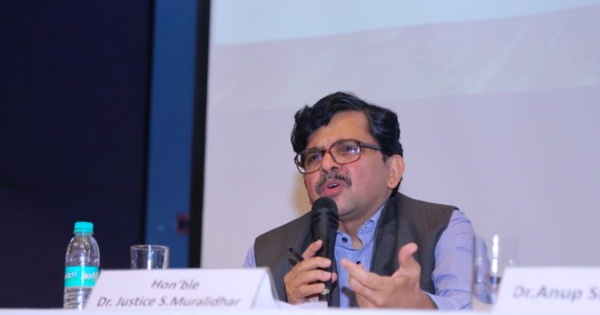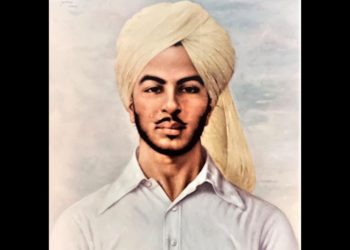
The Delhi High Court Bar Association and a full-court of the Delhi High Court today bid farewell to Dr Justice S. Muralidhar who has recently been transferred to the Punjab and Haryana High Court.
“Gandhi’s principle for weakest and Ambedkar’s principle for constitutional morality are my principles”, Justice Muralidhar reflected at his full-court reference.
“I find it hard to describe the affection I have received over 14 years. I can’t thank you enough”, said Justice Muralidhar.
The Delhi High Court Bar Association bid farewell to Dr. Justice S. Muralidhar. The farewell function saw heavy attendance by young members of the bar.
Justice Muralidhar has been transferred to the Punjab & Haryana High Court. pic.twitter.com/wtscZ7jhGm
— The Leaflet (@TheLeaflet_in) March 5, 2020
Justice Muralidhar called the young bar to imbibe constitutional values and to practice them continuously both at a personal and professional level.
Referring to his most moving moment, Justice Muralidhar recounted “In July 2009 Justice A P Shah and I delivered the judgement on Section 377. Many broke down in front of us here. That day we knew justice happened”.
In the full-court reference for Justice Muralidhar, the Chief Justice D N Patel in his address recounted the contribution of Justice Muralidhar as a member of the Bar and as the judge on the Bench.
“He (Justice Muralidhar) will always be remembered as an excellent judge of this court. His hard work and positivity will blossom at Punjab & Haryana High Court”, Chief Justice Patel said.
“Today’s gathering is indicative of the love and affection this Bar has for him” and added that Justice Muralidhar always “understood the plight of the petitioners”, Senior Advocate Maninder Acharya said while speaking at Justice Muralidhar farewell.
Rahul Mehra, standing counsel for the Delhi government, called Justice Muralidhar “a supremely respected, incredibly courageous and justice-oriented judge”.
“We all must find a Justice Muralidhar inside us, to guide us to say and do what needs to be done”, Mehra added.
Mohit Mathur, President of the DHCBA, said that “a people’s lawyer to people’s judge, your [Justice Muralidhar] name will go down in history as a champion of human rights”.
The central government had notified the transfer of Justice Muralidhar on the intervening night of February 26/27. The notification had come after the resolution of Supreme Court Collegium passed in its meeting held on Feb 12, where the Collegium recommended the transfer Justice Muralidhar from Delhi High Court to the Punjab & Haryana High Court.
The Delhi High Court Bar Association (DHCBA) had expressed its shock and condemned the transfer of Justice Muralidhar to the Punjab & Haryana High Court. DHCBA also abstained from work on February 20 as a token of protest.
The transfer order of Justice Muralidhar came after he passed two highly sensitive orders in the aftermath of Delhi riots for the protection of human rights of victims.
Orders in Delhi Riots
On the intervening night of February 25/26, Justice S Muralidhar held a hearing in his house along with Justice Anup J Bhambhani and ordered the Delhi Police to ensure the safe passage of the Delhi riots victims in a petition filed by Suroor Mander. The next day, the bench had further issued a slew of directions setting up of the adequate number of shelters to provide rehabilitation to displaced victims.
Again, on February 26 a division bench headed by Justice Muralidhar had pulled up the Delhi Police for its inaction in lodging First Information Reports (FIRs) against Bhartiya Janta Party leaders Kapil Mishra, Anurag Thakur and Parvesh Sahib Singh for their alleged inflammatory speeches.
Justice Muralidhar had also ordered the Delhi Police Commissioner to watch all the alleged videos of hate speech and to make a conscious decision on registration of FIRs. Justice Muralidhar passed the order in the petition filed by Harsh Mander seeking court’s intervention the Delhi riots and violence.
Justice Muralidhar began his law practice in Chennai in September 1984. He moved to New Delhi in 1987 to practice at the Supreme Court and the Delhi High Court.
He was active as a lawyer for the Supreme Court Legal Services Committee and later was its member for two terms. His pro bono work included the cases for the victims of the Bhopal Gas Disaster and those displaced by the dams on the Narmada.
Justice Muralidhar was part of the Bench, which had convicted the members of the Uttar Pradesh Provincial Armed Constabulary in the Hashimpura massacre case. He also convicted the Congress leader Sajjan Kumar to life imprisonment in the 1984 anti-Sikh riots case.
Justice Muralidhar is also the author of ‘Law, Poverty and Legal Aid: Access to Criminal Justice’ a book which was published by LexisNexis Butterworths in August 2004.




